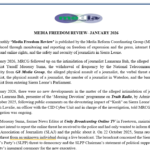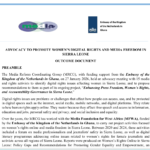Although a lot has been done to develop and adopt this policy, it is worth emphasizing
that an adopted policy is merely a piece of paper if the provisions and guidelines are
not domesticated and implemented as expected. I therefore recommend this policy to
all relevant AU Member States and wish them success in its effective implementation.”
These were the words of H.E. Ambassador Minata Samate Cessouma, Commissioner
for Political Affairs African Union Commission Addis Ababa, Ethiopia. The
Ambassador referred to the African Union—Transitional Justice Policy (AU-TJP).

Categories: TRANSITIONAL JUSTICE REPORTING









Leave a Reply